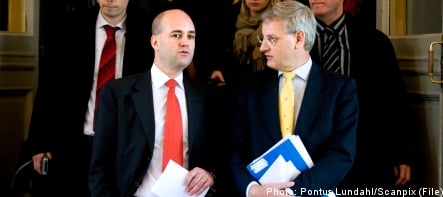Reinfeldt, who has served as prime minister since October 2006, has during
his three years in power proven himself as a solid, capable and popular statesman, according to observers.
“He is an incredibly thorough politician, who is always well-prepared and who leaves nothing to chance. He thinks everything through, and never acts on gut instinct,” Henrik Brors, editorialist at leading daily Dagens Nyheter, told AFP.
Reinfeldt used those skills to methodically shift his Moderate Party away from its right-wing upper class roots to appeal to a larger swathe of voters near the centre, making his party electable by convincing Swedes he wanted to fix their cherished welfare state, not destroy it.
That helped him wrest power away from the Social Democrats, who have governed Sweden for all but 12 of the past 77 years.
He has since implemented a slew of reforms, including reducing jobless benefits to boost employment and launching a major privatisation programme.
While the changes have been hard pills to swallow for some Swedes, Reinfeldt has consistently topped the polls as the country’s most viable leader — a position he has cemented during the global financial crisis.
“He has gained more self-confidence during the crisis, since the Swedish measures have been so well received by voters,” Brors said.
Reinfeldt, 43, is known for his cool, soft-spoken temperament and casual style. With his run-of-the-mill looks, he comes across as an ordinary Swede: he admits to enjoying housework and Swedish disco sensation ABBA.
Married to Filippa, a municipal politician with whom he has three children, Reinfeldt readily admits that neither he nor his party are visionaries, but rather pragmatists.
“Society is what people make of it, and not something that is decided from the top down,” he once said in a newspaper interview.
Perhaps it was pragmatism that prompted him to draw on Bildt’s vast diplomatic experience when he asked him three years ago to serve as foreign minister in his cabinet.
Bildt, widely seen in Sweden as one of the country’s most competent politicians but a touch arrogant, had not only served as prime minister from 1991 to 1994, he also harshly reprimanded a young Reinfeldt in 1994 when the latter criticised Bildt for being too dominant a figure in the Moderate Party.
Reinfeldt was frozen out of top party positions for several years.
“We were all very surprised when Reinfeldt appointed Bildt,” Brors said.
But three years on, the pair seem to have respect for each other’s abilities.
Bildt, 60, “appears to have accepted that he is not always number one, that sometimes he has to stand in Reinfeldt’s shadow,” Brors said.
With his strongly pro-European Union views, Bildt has devoted much of his time since the mid-1990s to the Balkans. That work has left its mark on his politics: he is a fierce advocate of welcoming eastern states into the EU as a way of ensuring peace and stability in Europe.
The slender, once-blond-now-greying Swede was made the international community’s first envoy in Bosnia in January 1996, two months after the agreement which determined the shattered nation’s post-war status.
He held that job, which required a firm hand in dealing with Bosnia’s complex politics, until June the next year.
He also spent a year and a half as the EU’s high representative to Bosnia- Hercegovina, during the period when the Balkan nation was emerging from the horrors of war.
Bildt is known for his boundless energy — which has been known to wear down his co-workers — and writes a blog where he comments daily on world events.
And while Bildt is not afraid to make waves, Brors said he expected to see a “toned-down” foreign minister during the Swedish presidency, which begins July 1st.
He speculated Bildt was eyeing a key post in the next European Commission, either as the new EU foreign minister or as enlargement commissioner.
Both jobs would appear to suit Bildt perfectly, now that his wife, Italian ex-diplomat and entrepreneur Anna Maria Corazza Bildt, was recently elected to the European parliament.
The couple have one son together, and Bildt has two other children from a previous marriage.



 Please whitelist us to continue reading.
Please whitelist us to continue reading.
Member comments